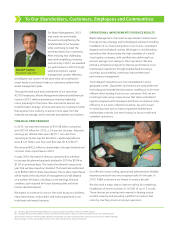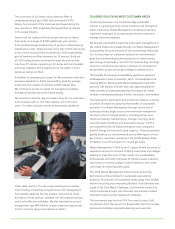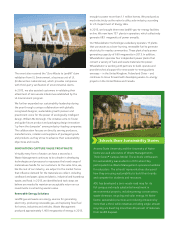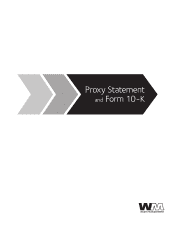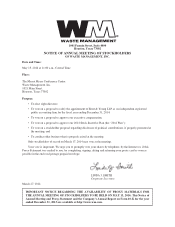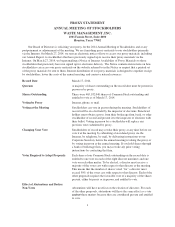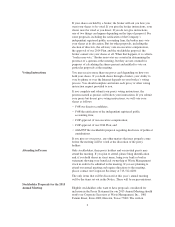Waste Management 2013 Annual Report Download - page 4
Download and view the complete annual report
Please find page 4 of the 2013 Waste Management annual report below. You can navigate through the pages in the report by either clicking on the pages listed below, or by using the keyword search tool below to find specific information within the annual report.
The conversion of our heavy-duty collection fleet to
compressed natural gas (CNG) fuel continued in 2013.
Ninety-four percent of the trucks we purchased during the
year operate on CNG, expanding the largest fleet of its kind
in the waste industry.
Every truck we replace with natural gas reduces our diesel
fuel use by an average of 8,000 gallons per year and per-
truck greenhouse gas emissions by 21 percent, while reducing
maintenance costs. Today we have more than 3,000 natural gas
trucks on the road and have exceeded our 2020 sustainability
goal of lowering our fleet emissions by 15 percent. Build out
of CNG fueling stations continued through the year and we
now have 57 stations operating in 22 states and two Canadian
provinces. Eighteen of the stations serve the public or third
parties as well as our fleet.
In addition to surpassing our target for fleet emission reduction,
we have exceeded our 2020 sustainability goals for acreage
protection and creation of certified wildlife habitat sites.
We continue to pursue our goals for managing recyclables
tonnage and producing waste-based energy.
We continue to look for ways to make it easy for our customers
to do business with us. Our main website, wm.com, hosts
some 1.5 million visits per month and generates significant
online sales revenue. The site is also evolving as a customer
tool for billing, scheduling and general account management.
Functionality added to the site enables customers to check
the status of their pickups, schedule roll-o container pickups,
and check collection schedules. We also launched an account
management app, WM Mobile, to give customers easy access
to their accounts using a smartphone or tablet.
TAILORED SOLUTIONS MEET CUSTOMER NEEDS
Conducting business in an environmentally sustainable
manner is a growing priority across industries and throughout
public institutions. Waste Management is helping customers
implement strategies to increase waste diversion rates and
manage diversion programs.
We provide sustainability expertise and project management in
the United States and Canada through our Waste Management
Sustainability Services network of environmental professionals.
Our services help our customers realize their environmental
goals by recommending business practices to reduce waste,
save energy and provide a “next life” for material they no longer
need. Our consultants also advise customers on strategies to
design better products through intelligent material choice.
The benefits of pursuing a sustainability agenda are apparent
at Renaissance Center in Dearborn, Mich., the headquarters of
General Motors. Working with Waste Management and other
partners, GM expects to divert each year approximately five
million pounds of waste generated by the massive six-tower
complex containing businesses, a hotel, restaurants, and retailers.
The hydrocarbon exploration and production industry is among
a number of industries capturing the benefits of sustainable
operation. Our Waste Management Energy Service line of
business provides single-source environmental management
services to the oil and gas industry, including pad services,
industrial cleaning, transportation, storage, recycling, liquid
and solid waste treatment and disposal processes. In 2013,
we acquired two North Dakota energy services companies,
Summit Energy Services and Liquid Logistics. These acquisitions
greatly enhance our environmental service oerings to oil and
gas industry customers operating in the prolific Bakken Shale
formation, one of the largest U.S. oil and gas fields.
Waste Management’s Think Green® Campus Model continues to
expand its services to forward-thinking universities and colleges
seeking to make the most of their waste. Our sustainability
professionals work with campuses to improve waste reduction
and resource recovery, analyze carbon footprints, and create
road maps for achieving green goals.
The 2013 Waste Management Phoenix Open powerfully
demonstrated the potential for sustainable operation by
diverting 100 percent of tournament waste away from landfills
and into recycling and composting facilities. Total diversion was
a goal of the Zero Waste Challenge, a tournament initiative to
control materials brought into the event and educate vendors
and patrons about proper disposal of materials.
The tournament was the first PGA Tour event to earn Gold
Certification from the Council for Responsible Sport for socially
and environmentally responsible planning and execution.



